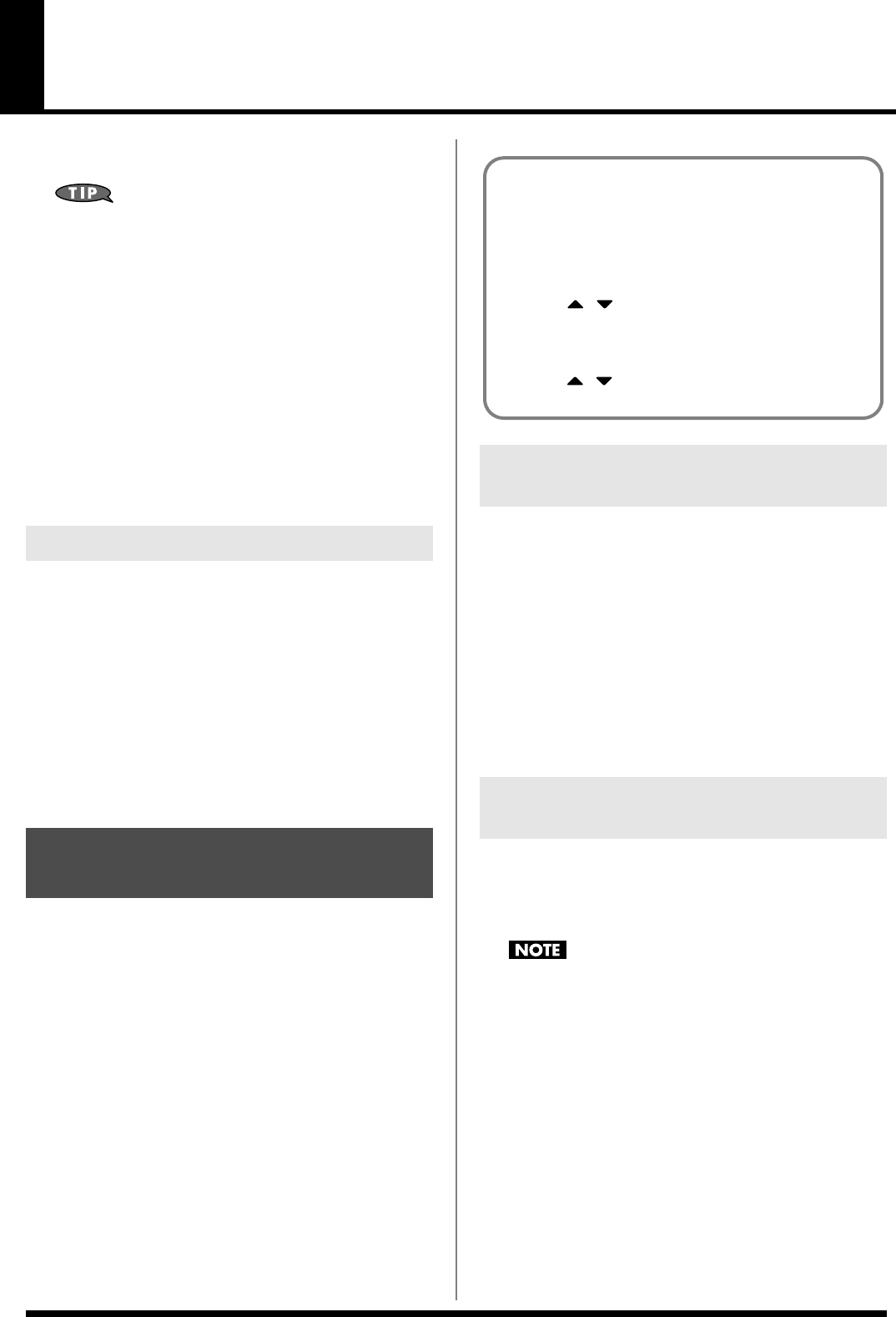
87
Recording a Song (MIDI Track)
This chapter explains the procedure for using the JUNO-G’s song
recorder to record a song.
Before you begin this procedure, put the sound generator in
Performance mode
. Normally, when recording or playing
back a song, you will put the sound generator in Performance
mode. The reason for this is that in this mode, only the sound of
the specified MIDI channel will be heard when you record
while playing the keyboard of the JUNO-G, and that when the
song is played back, the parts can independently play up to 16
different sounds. Thus, Performance mode is suitable for
recording and playing back a song that uses an ensemble of
multiple instruments, such as drums, bass, and piano. In
Performance mode, we recommend that you leave the keyboard
switches (p. 60) turned off (unchecked). If any keyboard
switches are on (checked), parts other than the current part will
also sound when you play the keyboard; you probably don’t
want this to occur while you’re creating a song.
You can use one of two methods of recording:
realtime recording
or
step recording
. Select the method that is appropriate for your situation.
Realtime Recording (p. 88)
Realtime recording is the recording method in which your keyboard
playing and controller operations are recorded just as you perform them.
Step Recording (p. 92)
Step recording is the recording method in which you can input notes
and rests one by one. This method is suitable for inputting drums or
bass with precise timing.
Overview of the Recording Process
The work flow for recording a new song (MIDI tracks) is as follows.
1.
Select the sound to be used for recording
2.
Clear the Temporary Song
3.
Specify the time signature of the song (p. 88)
4.
Set the tempo (p. 88)
5.
Use realtime recording (p. 88) or step recording (p. 92) to
record
6.
Use track edit (p. 97) or micro edit (p. 99) to edit the song
7.
Save the song to user memory or memory card (p. 113)
Before you record a song (MIDI tracks), select the sound that you
want to use for recording. Select the recording method that is
appropriate for your situation.
Performance
Select a Performance when you want to record an ensemble
performance using multiple instruments. When recording a song, we
recommend that you normally select a Performance.
Patch/Rhythm set
Select a patch or rhythm set if you want to use a single patch or
rhythm set to record your playing.
When you record a song (MIDI tracks), the sequencer data is
temporarily recorded in Temporary Area. If you want to record a
new song, you must erase any existing sequencer data from
Temporary Song.
If Temporary Song contains an important song that you want to
keep, you should first save that song to user memory/memory
card (p. 113).
1.
Press EDIT [SONG] to access the MIDI TRACK screen.
2.
Hold down [SHIFT] and press [F6 (UTILITY)].
The Song Utility Menu appears.
3.
Press [F2 (SONG CLEAR)].
A message will ask you for confirmation.
4.
Press [F6 (EXEC)] to execute the operation.
* To cancel, press [F5 (CANCEL)].
When the operation has been completed, the display will briefly
indicate “Completed!”
Two Recording Methods
Before You Record a New
MIDI Track
Select the Sound to be Used for
Recording
Erasing the Song from Temporary
Song (Song Clear)
With the factory settings, demo song data will automatically be
loaded into Temporary Area when the JUNO-G is powered up.
Here’s how to change this setting so that this automatic load
does not occur (i.e., the song memory will remain empty).
1. Press MODE [PERFORM] to access the PERFORM
PLAY screen.
2. Press [MENU].
3. Press [ ] [ ] to select “2. System,” and then press
[ENTER].
4. Press [F1 (GENERAL)], and then press [F2 (AUTO LD)]
to select “Startup.”
5. Press [ ] [ ] to select “Load Demo Song at Startup.”
6. Use the VALUE dial or [INC] [DEC] to set it to “OFF.”
JUNO-G_e.book 87 ページ 2006年2月13日 月曜日 午後2時44分
